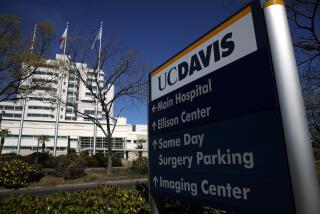Editorial: How to immunize more kids: California needs to ban personal-belief exemption for vaccinations
- Share via
Unvaccinated teenagers have been sent home from school for as long as three weeks. Dozens of babies who may have been exposed to measles have been placed in quarantine. One in four of the more than 73 Californians infected has required hospitalization. It’s getting hard to keep up with how many cases of measles have emerged thanks to the single infected woman who visited Disneyland just before Christmas, or where it might show up next.
Enough. It’s time to ensure that more Californians are vaccinated.The outbreak this winter has illustrated quickly and forcefully how a highly contagious disease can spread when the vaccination rate falls below the level needed for “herd immunity.” Herd immunity means that so many people are immune that the chance of outbreak is low, which protects the few who are not immunized because they are too young to have been fully vaccinated or because they are among the few in whom the vaccine doesn’t “take” or because they haven’t been vaccinated for valid medical reasons.
Certainly, vaccinations are not entirely risk-free. But the study linking vaccines to autism has been thoroughly discredited, and the rumors that childhood-disease vaccines contain mercury are just wrong. The most serious known side effect of the measles vaccination is severe allergic reaction, which strikes one in a million patients, according to the U.S. Centers for Disease Control and Prevention. By contrast, the death rate among measles victims is one in 1,000. In other words, the dangers from measles are far, far worse than from the vaccine.
FULL COVERAGE: Measles outbreak tied to Disneyland
For too long, California has been one of the minority of states that allow parents to use a vaguely defined “personal-belief” exemption — one based not on the dictates of an organized religion, but more generally on a person’s own preferences — to evade vaccination rules. Twenty-nine states offer no personal-belief exemptions, limiting exemptions to those who have medical or religious reasons. Two other states don’t allow religious exemptions at all.
This is the first school year that California has placed any restrictions on the exemptions: Parents must get a form signed by a health practitioner saying that they have been informed about the risks and benefits of vaccines (though Gov. Jerry Brown imposed rules that make it easy to get around the law). There has been a little improvement. In December, the state reported a drop in the number of personal-belief exemptions claimed by the parents of new kindergartners for the first time in a decade, along with a very slight uptick in the percentage of vaccinated children. But that was a fraction of what is needed to restore herd immunity.
This is the perfect time for the Legislature to pass a new bill banning the personal-belief exemption for public-school students. If the state keeps the religious exemption, it should be narrowly tailored. It’s wrong to allow public health to be threatened while everyone else waits for these science-denying parents to open their eyes.
Follow the Opinion section on Twitter @latimesopinion
More to Read
A cure for the common opinion
Get thought-provoking perspectives with our weekly newsletter.
You may occasionally receive promotional content from the Los Angeles Times.










